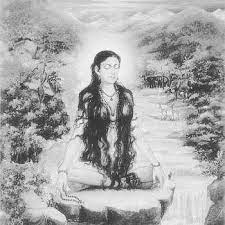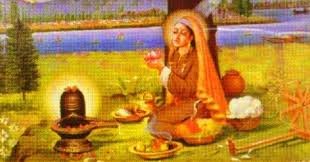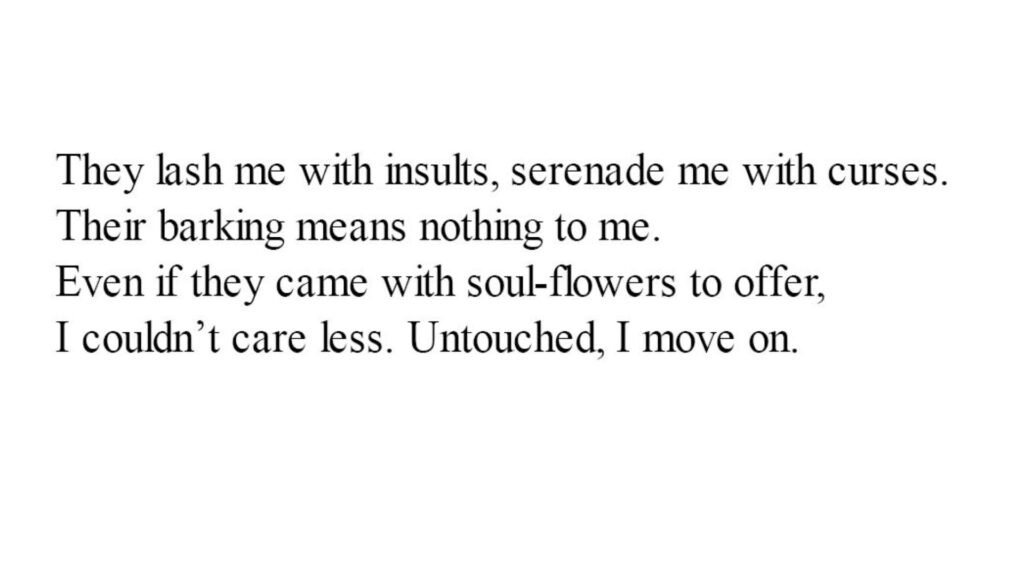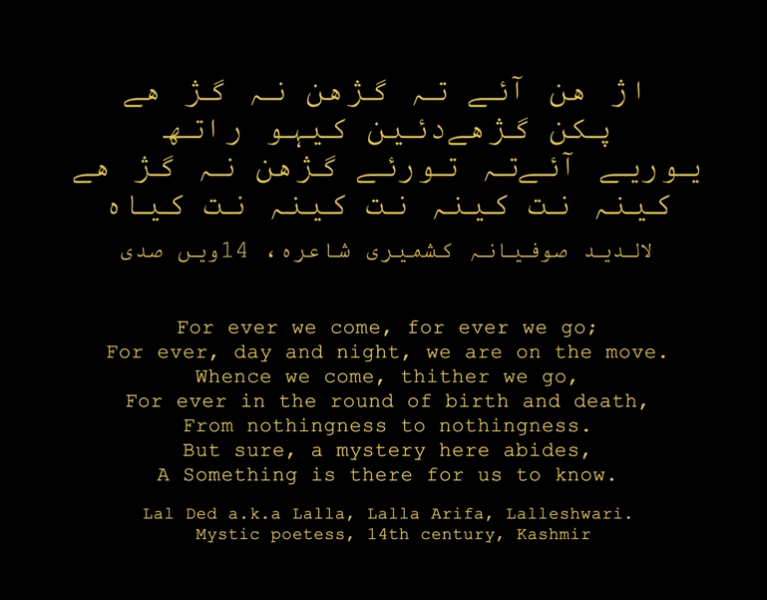
Lal Ded is an indigenous name in the beautiful land of Kashmir, the land that has acquired the name of ‘paradise on earth’ from poets and chroniclers cited in literature and memoirs. Lal Ded was a 14th-century saint-poetess, a Kashmiri Shaivite, praised for her Vaaks or verses, that was powerful, poignant & philosophical. They constitute a significant part of Kashmiri literature, handed down in oral tradition, generation after generation, to impart wisdom and establish a connection to the Supreme. Her Vaaks were not just poetic, they shaped the Kashmiri language itself, and kept her alive in people’s hearts forever. In Kashmir, it is Lal Ded’s Vaaks that rules poetry! Lal Dev (1320 -1392) was also known by a host of other names like Lal Dyad, Lalla Aarifa, Lalishri, Lalleshwari, and Lalla Yogeshwari.
Early life and Marriage
Lal Ded was born in a Kashmiri Brahmin family, in Pandrethan (ancient Puranadhisthana), near Srinagar in the Kashmir Valley which today constitutes the central part of Kashmir. As a child, she received education at home from her family priest Siddha Srikanth, who also initiated her into Shaivite Sampradaya observing her deep spiritual inclinations.
She was given away in marriage at the tender age of 12. As per local customs then, she was renamed Padmavati in her in-law’s house, but she continued to be known as Lal Ded. It is said that her mother-in-law treated her cruelly, starved her for days on end by hiding a heavy stone on her plate under a heap of rice, making others falsely believe that she fed her daughter-in-law well. Lal Ded’s husband’s passivity and cowardice in not standing up for her also hurt her very much.
Once when her friends affectionately teased her by asking whether she would share with them a feast planned by her in-laws, she replied “hund maritan kinah kath noshi nalvat tsalih nah zanh” (Whether they kill a big or a small sheep, it is all the same for the daughter-in-law, who is used to the round heavy stone). This utterance turned later into a popular Kashmiri proverb.

Lal Ded would cross a nearby river secretly to visit a temple and worship Natha Kesava Bhairava (Shiva). Her husband suspected her of infidelity and one day in a jealous rage hit the earthenware pitcher of water she carried on her head into her home. Although the pitcher was shattered, it was a miracle that the water remained frozen atop her head until she poured them into vessels. She tossed a few leftovers drops out the door that collected into a pond now known as “Lalla Trag”.
After forbearing for too long her miserable marriage, Lal Ded abandoned her home at the age of 24 and became a renunciate to seek the ultimate truth of life through her spiritual quest.
My guru gave a single precept:
turn your gaze from outside to inside
fix it on the hidden self.
I, Lalla, took this to heart
and naked set forth to dance
(Translation by Andrew Schelling)
Literary works and influences – revered by both Hindus and Muslims
Around 250 Vaakhs are regarded as the poetic mystic musings of Lal Ded, called Lal Vaaks, they form a significant part of Kashmiri literature disseminated into local languages and folk traditions. The poems, structured in 4 lines enshrine profound teachings for the upliftment of humanity. They reject caste discrimination, gender inequalities, social orthodoxy and reveal her affinity with the teachings of Shaivism and Vedanta, and also echo the wisdom of The Bhagavad Gita.
The universal appeal of her verses also inspired the Sufis.
The distinguished Sufi saint-poet and Islamic preacher in Kashmir – Nund Reshi (aka Sheikh Noor-ud-Din; 1377-1438 CE) who was among the founders of Sufi tradition and had an important role in shaping Kashmir’s medieval identity, was greatly influenced by Lal Ded.
Lal Ded was born at a time when the last Hindu King Sahadeva fell, Mongol invasions devastated Kashmir, Islamic conversions became rampant, and Sultan Shams-ud-Din established his Shah Mir dynasty which lasted for around two centuries (1339 -1561).
Witnessing great political and religious turbulence in the land, Lal Ded expressed them in her spiritual sayings. She was cherished as Lalla Arafia (the realized one) by the Muslims, Lalla Yogishwari (exponent in yogic practices) by the Hindus, and Lalla (Mother Lalla) by the commoners.
Some Famous Translations of Lal Vaaks
I, Lalla, entered
the gate of the mind’s garden and saw
Siva united with Shakti.
I was immersed in the lake of undying bliss. Here, in this lifetime,
I’ve been unchained from the wheel
of birth and death.
What can the world do to me?
(Translation by Andrew Schelling)
The soul, like the moon, is new, and always new again.
And I have seen the ocean continuously creating.
Since I scoured my mind and my body, I too, Lalla am new, each moment new.
My teacher told me one thing,
Live in the soul. When that was so, I began to go naked, and dance.
(Translation by Coleman Barks)


The first mention of Lal Ded’s name is found in Tadhkirat ul-Arifin in 1587, a collection of biographies of saints and religious figures written by Mulla Ali Raina, a famous Sufi saint. The first printed and published volume of translations of Lal Ded’s poems was by Sir George Grierson’s (1914). Notable among other translations are those by Pandit Ananda Koul (1921), Sir Richard Temple (1924), and Jaylal Kaul (1973). More recent include translated works by Coleman Barks, Jaishree Kak, Neeraj Mattoo, Paul Smith and Ranjit Hoskote.
“Growing up in Kashmir, I have memories of spectacular Himalayan mountains, magnificent lakes and countless rivers snaking through the valley, and accompanying all is the echoing on festive occasions of the melodious singing of Lalla’s verse-sayings, popularly known as Lalla-Vākh. Her outpourings are timeless and people of all faiths have treasured them.”
– author Jaishree Kak, Mystical verses of Lalla
“Lalleshwari is credited with laying the reinforced concrete basis of the language [Kashmiri] by her dext(e)rous coinage of apt idioms and proverbs to infuse life and dynamism into it from its very infancy. Her cryptic, terse sayings still continue to enliven scholarly discussion and resolve social problems.” – author P.N Razdan, Book – Gems of Kashmiri Literature and Kashmiriyat (The Trio of Saint Poets-1)
The only light that Lal Ded sought was knowledge of the truth, the only pilgrimage she undertook was the journey of love for the Almighty, and the only companion she yearned was the Supreme. It was this firm resolve that made her daring and determined to break the chains of societal norms, prejudices and discrimination.
If the quality of living in Kashmir is made heavenly by its breathtaking beauty, the forests and meadows, the colourful flowers and fruits, picturesque rivers and lakes then undoubtedly the quality of life is elevated by the singing of Lal Ded’s verses that are embedded in the culture and ring a bell in day-to-day conversation in every Kashmiri household!






Add comment